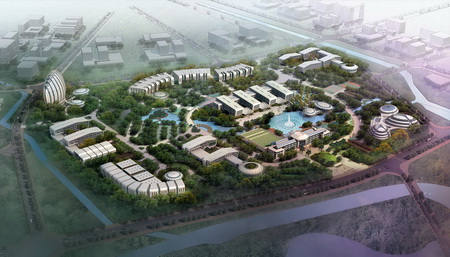
The Qingdao National Laboratory for Marine Science and Technology is China’s first national-level marine science lab. Integrating almost all of China’s top marine research power, it is located in the coastal city of Qingdao, in the eastern province of Shandong.
Approved by the Ministry of Science and Technology in late 2013, the laboratory draws scientists from 11 marine-related organizations, including the Ocean University of China and the Institute of Oceanology of the Chinese Academy of Sciences.
“This is the first attempt for China to consolidate its marine research strength that used to be dispersed in research institutions and universities,” said WU Lixin, head of the laboratory, and also Academician of the Chinese Academy of Sciences.

CAS Academician WU Lixin, head of the Qingdao National Laboratory for Marine Science and Technology
With a total investment of 1.3 billion yuan (200 million U.S. dollars), the laboratory covers an area of 150,000 square meters and has eight functional labs covering such fields as marine and climate change, evolution and the protection of marine environments, and the sustainable use of marine biological resources.
The laboratory is expected to become one of the world's top five oceanographic research institutions within the next three years, competing with the likes of the Scripps Institute of Oceanography and the Woods Hole Oceanographic Institute in the United States, and the National Oceanographic Center of Britain, WU said.
The lab has three strategic targets it aims to achieve during China’s 13th Five-year Plan period, namely, “Transparent Ocean,” “Blue Life,” and “Submarine Resources.” The targets focus on marine observation and marine dynamics research; marine fisheries and marine pharmacology; and undersea mineral resources, respectively.
 |
| Qingdao National Laboratory for Marine Science and Technology loacated in the east coast of China. (Image by CAS) |
An ocean-drilling research vessel is also being developed to enhance the country's exploration of deep-sea resources, according to WU. The vessel, named Dream, will be the third in the world when completed, following the United States' JOIDES Resolution and Japan's Chikyu.
WU said he believes building Dream would boost the development of deep-sea-related technology in China and enhance the country's reputation for making such equipment.
The establishment of the marine lab echoes the call from China’s President XI Jinping to “advance research in deep sea and space exploration.” XI has also called for efforts to launch key projects to create a world-class research network.
China now has many key labs specializing in particular areas of research. However, the country’s need for cross-disciplinary research and national projects calls for creation of comprehensive national laboratories to address state-level S&T tasks.
"Much research that is urgent and actively demanded by the country needs to be done. There is cross-disciplinary research requiring cutting-edge research facilities that can only be funded by the government and that require hundreds, even thousands of talented experts. So, a multi-program national laboratory is needed," said DING Hong, a CAS researcher and Chief Scientist of the Beijing National Laboratory for Condensed Matter Physics of CAS.
 |
| Trasnparent Ocean will focus on marine observation and marine dynamics research. (Image by CAS) |
WU agrees. The establishment of the marine laboratory aims to break down fences between different research institutions and integrate China’s currently fragmented marine research, he said. “A national lab should meet national demand, target the frontiers of science, and consolidate all resources for research,” said WU. “Big task needs a big platform.”
The national marine lab is a national project that will serve the national interest. However, it will also open its arms to international researchers. For example, eight countries have joined the “Transparent Ocean” project under the “Belt and Road Initiative,” an initiative proposed by President Xi Jinping to promote the orderly and free flow of economic factors, the highly efficient allocation of resources and the thorough integration of markets, by enhancing connections among the Asian, European and African continents and their adjacent seas.
Upon completion, the laboratory is expected to have about 10,000 people working in different functional labs, according to WU. Of these, many will be from overseas research institutions. More global marine research talent will bring more power to solve marine problems related to the sustainable development of mankind.
“As we say, it’s ‘One Ocean, Many Nations’,” said WU.

86-10-68597521 (day)
86-10-68597289 (night)

86-10-68511095 (day)
86-10-68512458 (night)

cas_en@cas.cn

52 Sanlihe Rd., Xicheng District,
Beijing, China (100864)

